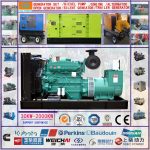In times of crisis and calamity, having a reliable source of power can make a significant difference in ensuring the safety, security, and well-being of individuals and communities. Diesel generators have long been a cornerstone of emergency preparedness plans, providing a robust and dependable power supply when the grid fails. With their durability, efficiency, and versatility, diesel generators play a crucial role in powering essential services, critical infrastructure, and emergency response efforts during natural disasters, blackouts, and other emergencies.
This comprehensive guide explores the importance of diesel generators in emergency preparedness, highlighting their key features, benefits, applications, and considerations for optimal performance. From understanding Best 400kW generator for commercial use of diesel generator operation to implementing best practices for maintenance and safety, this article serves as a valuable resource for individuals, businesses, and organizations seeking to enhance their resilience in the face of unforeseen events.
I. Introduction to Diesel Generators

A. What is a Diesel Generator?
1. Definition and Functionality
2. Components and Operation
3. Types of Diesel Generators
B. Advantages of Diesel Generators
1. Reliability and Durability
2. Fuel Efficiency and Cost-Effectiveness
3. Quick Start-Up and Load Handling
II. Diesel Generators in Emergency Preparedness
A. Importance of Power Backup
1. Critical Infrastructure Needs
2. Public Safety Concerns
3. Business Continuity Planning
B. Applications of Diesel Generators in Emergencies
1. Hospitals and Healthcare Facilities
2. Emergency Shelters and Relief Centers
3. Communication Networks and Data Centers
C. Role of Diesel Generators in Disaster Response
1. Supporting First Responders
2. Restoring Power and Services
3. Mitigating the Impact of Disasters
III. Selecting the Right Diesel Generator
A. Capacity and Power Requirements
1. Determining Load Demand
2. Sizing and Rating Considerations
3. Scalability and Future Expansion
B. Fuel Type and Availability
1. Diesel Fuel Characteristics
2. Storage and Supply Chain Management
3. Environmental Considerations
C. Integration and Connectivity
1. Automatic Transfer Switches
2. Remote Monitoring and Control Systems
3. Parallel Operation and Redundancy
IV. Installation and Maintenance Best Practices
A. Site Selection and Preparation
1. Environmental Factors
2. Ventilation and Exhaust Systems
3. Compliance with Regulations
B. Routine Maintenance and Inspection
1. Fuel Quality Management
2. Oil and Filter Changes
3. Battery Testing and Replacement
C. Emergency Response Plans and Testing
1. Regular Load Testing
2. Contingency Planning
3. Training and Personnel Preparedness
V. Safety and Environmental Considerations
A. Fire Safety and Hazard Prevention
1. Fire Suppression Systems
2. Fuel Spillage and Containment
3. Emergency Shutdown Procedures
B. Noise and Emissions Control
1. Acoustic Enclosures and Insulation
2. Emission Reduction Technologies
3. Compliance with Regulatory Standards
VI. Case Studies and Success Stories
A. Real-World Examples of Diesel Generator Deployments
1. Hurricane Response Efforts
2. Power Outage Resilience in Urban Areas
3. Remote Site Power Solutions
B. Lessons Learned and Best Practices
1. Effective Coordination with Authorities
2. Community Engagement and Support
3. Continuous Improvement and Innovation
VII. Conclusion: The Future of Diesel Generators in Emergency Preparedness
A. Emerging Trends and Technologies
1. Hybrid Power Systems
2. Renewable Energy Integration
3. Smart Grid Solutions
B. Building Resilience for Tomorrow
1. Collaborative Partnerships
2. Education and Awareness Initiatives
3. Sustainable and Adaptive Strategies
In conclusion, diesel generators are indispensable assets in emergency preparedness and disaster response efforts, providing a reliable and robust source of power when the unexpected strikes. By understanding the key features, benefits, applications, and considerations associated with diesel generators, individuals, businesses, and organizations can enhance their resilience and readiness to face a wide range of challenges and disruptions. As technology advances and new solutions emerge, diesel generators will continue to play a vital role in safeguarding lives, protecting property, and ensuring continuity of services in times of need.
